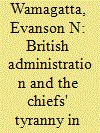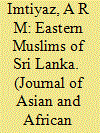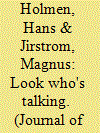| Srl | Item |
| 1 |
ID:
090210


|
|
|
|
|
| Publication |
2009.
|
| Summary/Abstract |
This article argues that the chiefs' tyranny in early colonial Kenya had its roots in the British administrative style since the Government needed strong-handed local leaders to enforce its unpopular laws and regulations. That was why the chiefs got away with their tyranny because the Government condoned it to a certain extent. They also got away with it because of the alien nature of their positions, their duties and their people inadvertently condoning it. The first generation of chiefs from Kiambu district is used as a case study to illustrate what was happening in the colony during the period under study.
|
|
|
|
|
|
|
|
|
|
|
|
|
|
|
|
| 2 |
ID:
090214


|
|
|
|
|
| Publication |
2009.
|
| Summary/Abstract |
Conflict in Sri Lanka between the Tamils and the Sinhalese brought the Eastern Muslims into the crossfire. Muslim elites and politicians generally cooperate with the Sinhalese ruling class. Such cohabitation irritated the Tamils. Since 1985, relations between the Tamils and the Muslims in the Eastern region have become strained, and Muslims claimed they have some problems to be solved. This study attempts to identify some special problems of the Eastern Muslims. A questionnaire on the special problems of the Eastern Muslims was distributed to the Eastern youth, students, unemployed Muslims and farmers. The population of the target group was selected randomly. More than 150 questionnaires were issued with a 75 percent response rate. Interviews were also conducted on the phone with an educated section of the Eastern Muslims. This study also suggests solutions to the protracted ethno-political conflict based on power sharing.
|
|
|
|
|
|
|
|
|
|
|
|
|
|
|
|
| 3 |
ID:
090212


|
|
|
|
|
| Publication |
2009.
|
| Summary/Abstract |
Unlike many texts, the constitutive act of the Treaty instituting CEMAC contains no provision regarding the sovereignty of states. The CEMAC policies capture virtually all fundamental aspects of community life: legal integration; harmonization of economic, financial and monetary policies; convergence of budgetary policies; and the free circulation of goods, capital and persons. This article purports that communitarization entails ultimately the diminishing of the national sovereignties and, in spite of some limits, CEMAC is a step in the right direction. The existence of effective community organizations within the African zone can serve as catalysts to the larger and most needed African Union.
|
|
|
|
|
|
|
|
|
|
|
|
|
|
|
|
| 4 |
ID:
090216


|
|
|
|
|
| Publication |
2009.
|
| Summary/Abstract |
Non-governmental organizations (NGOs) are major players in development aid today. It is widely believed they represent civil society and that, for example, the UN and the World Bank would be strengthened if NGOs were given a larger influence over policy formulation and development. As one can hardly speak of an NGO community, the issue of representation is far from easily solved. NGOs often compete for visibility, clients and influence, and representation leaves a lot to be desired. Hence, governments' and inter-governmental institutions' reluctance to accept immediately NGOs as partners, may be necessary for NGOs to become representative and, paradoxically, for strengthening civil society as well.
|
|
|
|
|
|
|
|
|
|
|
|
|
|
|
|
| 5 |
ID:
090217


|
|
|
|
|
| Publication |
2009.
|
| Summary/Abstract |
This article explores the dynamism of traditional political institutions by examining the state-creation process in 1990s Nigeria. Struggles over the Nigerian political map have involved sometimes bitter contests over land, resources and identity. Traditional rulers and institutions have been key players in these struggles. The article analyzes two key relationships: negotiations of tradition with reference to new state proposals (with an emphasis on territorial boundaries and administrative headquarters), and the two-way negotiations of survival involving military rulers and traditional political leaders. Semi-structured interviews with key correspondents and archival work were employed in the research. The research includes a primary case study of Ekiti State from the Southwest, and complementary material from other areas of Nigeria.
|
|
|
|
|
|
|
|
|
|
|
|
|
|
|
|